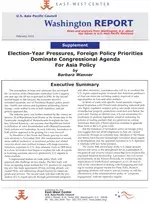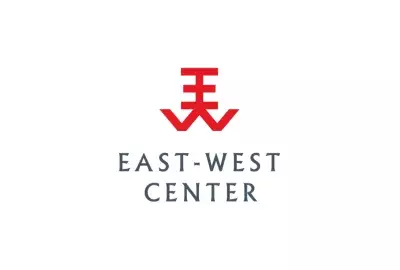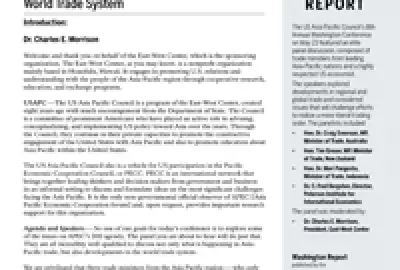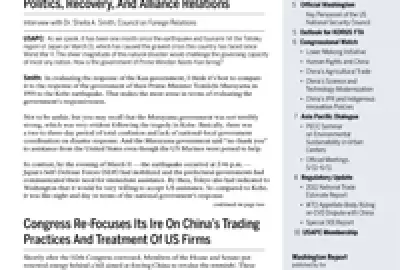Error message

|
The atmosphere of hope and optimism that enveloped the 1st session of the Democratic-controlled 111th Congress one year ago has all but evaporated in 2010. As the second session began in late January, the economic recovery remained uncertain, two of President Obama's policy priorities--health care reform and legislation addressing climate change--were stalled in one or both chambers, and job growth appeared flat. The majority party was further stunned by the victory on January 19 of Republican Scott Brown in the Senate race in the Democratic stronghold of Massachusetts to replace the late Sen. Edward Kennedy--an outcome that Republicans hailed as indicative of voter dissatisfaction with Obama/Democratic Party policies and leadership. In early February, lawmakers in both parties appeared to be groping for a way forward. As Members of the House and Senate gear up for midterm elections in November 2010, this undercurrent of anxiety about stalled, ineffective, or unformed policies and related concerns about one's political fortunes will shape economic initiatives important to U.S.-Asia relations. Even as 2009 drew to a close, lawmakers had begun to explore the role of exports in fostering economic recovery, particularly U.S. exports to Asian markets. Congressional leaders on trade policy likely will approach this challenge on two tracks. The first track will focus on opening Asian markets for U.S. products by negotiating new free trade agreements (FTAs), refining already concluded FTAs, and addressing alleged barriers to American goods and services. The second track will deal with the promotion of U.S. export growth through government programs and other assistance. Lawmakers also will try to overhaul the U.S. export control regime to ensure that American producers of dual-use items are not being unduly deprived of sales opportunities in Asia and other markets. In terms of trade with specific Asian partners, congressional frustration with China's trade-distorting industrial policies, highly regulated currency policy, and weak enforcement of intellectual property protections could boil over before the year's end. During an election year, it is not uncommon for lawmakers to promote legislation aimed at redressing the policies of trading partners that are perceived as costing Americans their jobs. China's practices continue to generate those fears at the U.S. grass roots. But the initiatives of lawmakers active on foreign policy also suggest that not all developments in Asia are viewed exclusively through an economic lens. Members of the House and Senate have become increasingly concerned about regional developments and the apparent transition in U.S. diplomatic relations with key Asian partners. The recent 50th anniversary of the U.S.-Japan security alliance will serve as the springboard for an examination of the political and security-related issues that have strained this important bilateral relationship. Lawmakers also will revisit developments on the Korean Peninsula, by considering the implications of South Korea's emergence as a G-20 host as well as the conundrum of dealing with Pyongyang and ending its nuclear program via the Six-Party Talks. Burma's upcoming elections will receive special scrutiny as will the effectiveness of the administration's policy of "pragmatic engagement" with the repressive regime. |
|
The atmosphere of hope and optimism that enveloped the 1st session of the Democratic-controlled 111th Congress one year ago has all but evaporated in 2010. As the second session began in late January, the economic recovery remained uncertain, two of President Obama's policy priorities--health care reform and legislation addressing climate change--were stalled in one or both chambers, and job growth appeared flat. The majority party was further stunned by the victory on January 19 of Republican Scott Brown in the Senate race in the Democratic stronghold of Massachusetts to replace the late Sen. Edward Kennedy--an outcome that Republicans hailed as indicative of voter dissatisfaction with Obama/Democratic Party policies and leadership. In early February, lawmakers in both parties appeared to be groping for a way forward. As Members of the House and Senate gear up for midterm elections in November 2010, this undercurrent of anxiety about stalled, ineffective, or unformed policies and related concerns about one's political fortunes will shape economic initiatives important to U.S.-Asia relations. Even as 2009 drew to a close, lawmakers had begun to explore the role of exports in fostering economic recovery, particularly U.S. exports to Asian markets. Congressional leaders on trade policy likely will approach this challenge on two tracks. The first track will focus on opening Asian markets for U.S. products by negotiating new free trade agreements (FTAs), refining already concluded FTAs, and addressing alleged barriers to American goods and services. The second track will deal with the promotion of U.S. export growth through government programs and other assistance. Lawmakers also will try to overhaul the U.S. export control regime to ensure that American producers of dual-use items are not being unduly deprived of sales opportunities in Asia and other markets. In terms of trade with specific Asian partners, congressional frustration with China's trade-distorting industrial policies, highly regulated currency policy, and weak enforcement of intellectual property protections could boil over before the year's end. During an election year, it is not uncommon for lawmakers to promote legislation aimed at redressing the policies of trading partners that are perceived as costing Americans their jobs. China's practices continue to generate those fears at the U.S. grass roots. But the initiatives of lawmakers active on foreign policy also suggest that not all developments in Asia are viewed exclusively through an economic lens. Members of the House and Senate have become increasingly concerned about regional developments and the apparent transition in U.S. diplomatic relations with key Asian partners. The recent 50th anniversary of the U.S.-Japan security alliance will serve as the springboard for an examination of the political and security-related issues that have strained this important bilateral relationship. Lawmakers also will revisit developments on the Korean Peninsula, by considering the implications of South Korea's emergence as a G-20 host as well as the conundrum of dealing with Pyongyang and ending its nuclear program via the Six-Party Talks. Burma's upcoming elections will receive special scrutiny as will the effectiveness of the administration's policy of "pragmatic engagement" with the repressive regime. |







